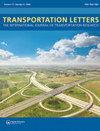A tripartite evolutionary game study on the governance of online catering riders’ traffic violations from the perspective of collaborative regulation
IF 3.3
3区 工程技术
Q2 TRANSPORTATION
Transportation Letters-The International Journal of Transportation Research
Pub Date : 2025-04-21
DOI:10.1080/19427867.2024.2378612
引用次数: 0
Abstract
In the online catering industry, delivery riders’ traffic violations significantly threaten public transportation safety, inadequately addressed by current regulations from the government and online platforms. This paper proposes a government-led collaborative regulatory mechanism with active platform participation. A tripartite evolutionary game model, including the government, platforms, and riders, evaluates this approach. Findings suggest that collaborative regulation forms when the combined start-up and subsidy costs of government-led regulation are less than the total benefits of collaboration and when the cost difference between active and passive platform participation is less than the total benefit of active participation. Effective regulation occurs when combined penalties for riders’ violations exceed the profit difference between illegal and compliant deliveries. Reducing government regulation start-up costs and increasing penalties and enforcement probabilities can promote compliance among riders. Excessive subsidies to platforms do not effectively control violations, indicating the need for balanced subsidy allocation for optimal regulatory effectiveness.
协同规制视角下网络餐饮骑手交通违法治理的三方进化博弈研究
在网络餐饮行业,外卖骑手的交通违规行为严重威胁着公共交通安全,而目前政府和网络平台的监管规定并未充分解决这一问题。本文提出一种政府主导、平台积极参与的协同监管机制。一个三方博弈进化模型,包括政府、平台和乘客,对这种方法进行了评估。研究结果表明,当政府主导的监管启动成本和补贴成本之和小于协作总收益,且平台主动参与和被动参与的成本差小于主动参与总收益时,协同监管就形成了。当对骑手违规行为的综合处罚超过违规和合规交付之间的利润差时,有效的监管就会出现。降低政府监管启动成本,增加处罚和执行概率,可以促进乘客的合规。对平台的过度补贴并不能有效控制违规行为,这表明需要平衡补贴分配以获得最佳监管效果。
本文章由计算机程序翻译,如有差异,请以英文原文为准。
求助全文
约1分钟内获得全文
求助全文
来源期刊

Transportation Letters-The International Journal of Transportation Research
TRANSPORTATION SCIENCE & TECHNOLOGY-
CiteScore
6.40
自引率
14.30%
发文量
79
审稿时长
>12 weeks
期刊介绍:
Transportation Letters: The International Journal of Transportation Research is a quarterly journal that publishes high-quality peer-reviewed and mini-review papers as well as technical notes and book reviews on the state-of-the-art in transportation research.
The focus of Transportation Letters is on analytical and empirical findings, methodological papers, and theoretical and conceptual insights across all areas of research. Review resource papers that merge descriptions of the state-of-the-art with innovative and new methodological, theoretical, and conceptual insights spanning all areas of transportation research are invited and of particular interest.
 求助内容:
求助内容: 应助结果提醒方式:
应助结果提醒方式:


